Latest DePIN News

a year ago
Harnessing Web3 Technology for Climate Action
In the ongoing battle against climate change, the importance of transparency and accountability in climate action initiatives cannot be overstated. These initiatives, which range from carbon credits to tree-planting campaigns, necessitate robust systems for monitoring and verifying progress. Web3 technology emerges as a transformative solution, utilizing its decentralized and immutable characteristics to provide a secure and transparent framework for tracking eco-friendly projects. By employing blockchain, smart contracts, and decentralized networks, Web3 enhances trust and efficiency in global climate action efforts.
The carbon credit market has long been plagued by issues such as fraud and double-counting, undermining its effectiveness. Web3 offers a remedy by creating a decentralized, tamper-proof ledger for issuing, tracking, and verifying carbon credits. Tokenization ensures each credit is unique and cannot be manipulated, while smart contracts automate the verification process, issuing credits only after independent validation. This system reduces reliance on intermediaries, cutting costs and fostering trust. Decentralized carbon marketplaces exemplify this potential, allowing peer-to-peer trading of carbon credits with complete transaction transparency, thereby ensuring that credits are linked to genuine environmental projects.
Moreover, Web3 technology can significantly improve the tracking and verification of tree-planting initiatives, which are crucial for carbon capture and biodiversity support. Traditional methods often suffer from inefficiencies and potential corruption. By utilizing blockchain, every stage of a tree's life cycle can be monitored, and smart contracts can ensure that funds are released only after independent validation of planting efforts. This decentralized approach not only enhances transparency but also empowers individuals and communities to actively participate in climate action. By tokenizing rewards and utilizing decentralized finance, eco-friendly projects can attract global support, paving the way for a more sustainable future that prioritizes accountability and collaboration.
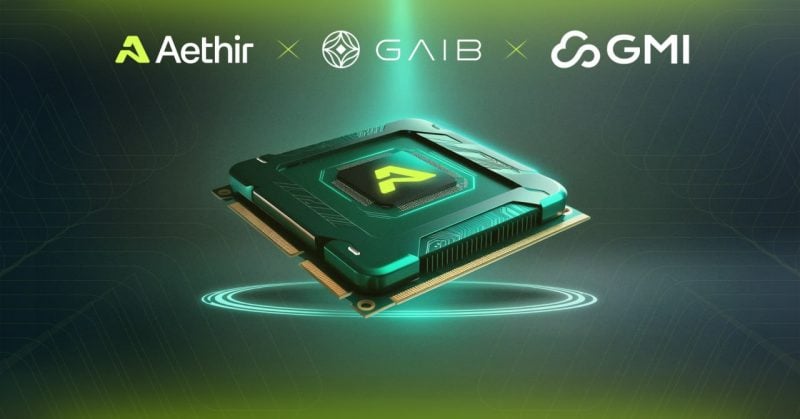
a year ago
Aethir Partners with GAIB and GMI Cloud to Enhance AI Development with H200 GPUs
In a significant development for the AI landscape, Aethir has partnered with GAIB and GMI Cloud to integrate H200 Tensor Core GPUs into their decentralized computing platforms. This collaboration aims to democratize access to high-performance GPU resources, making it easier and more cost-effective for developers and businesses worldwide to engage in AI and machine learning. Daniel Wang, CEO of Aethir, emphasized that this integration empowers the next generation of AI developers by providing them with the necessary tools to build, train, and deploy advanced models, regardless of their geographical or financial limitations.
GAIB is introducing an innovative financial model that allows users to invest in GPU-backed assets, thereby generating rewards and yields. Kony, CEO of GAIB, highlighted that this model addresses the challenges associated with investing in illiquid compute assets and lowers the barriers to entry for potential investors. By transforming GPUs into liquid, tradeable yield-bearing assets, GAIB aims to unlock new investment opportunities and enhance market efficiency, ultimately contributing to the growth of the AI economy.
GMI Cloud's role in this partnership focuses on optimizing the integration of the H200 GPUs, ensuring they deliver peak performance. Alex Yeh, founder and CEO of GMI Cloud, stated that their mission is to support humanity's AI ambitions by providing an efficient, on-demand GPU cloud. This collaboration not only enhances computational capabilities for enterprises and developers but also drives innovation in AI applications. The H200 GPUs, built on the Hopper architecture, promise significant improvements in memory, bandwidth, and efficiency, further solidifying the foundation for the AI era. Additionally, Aethir's recent launch of the Aethir Catalyst program, which allocates $100 million to AI and gaming startups, underscores their commitment to fostering innovation in this space.
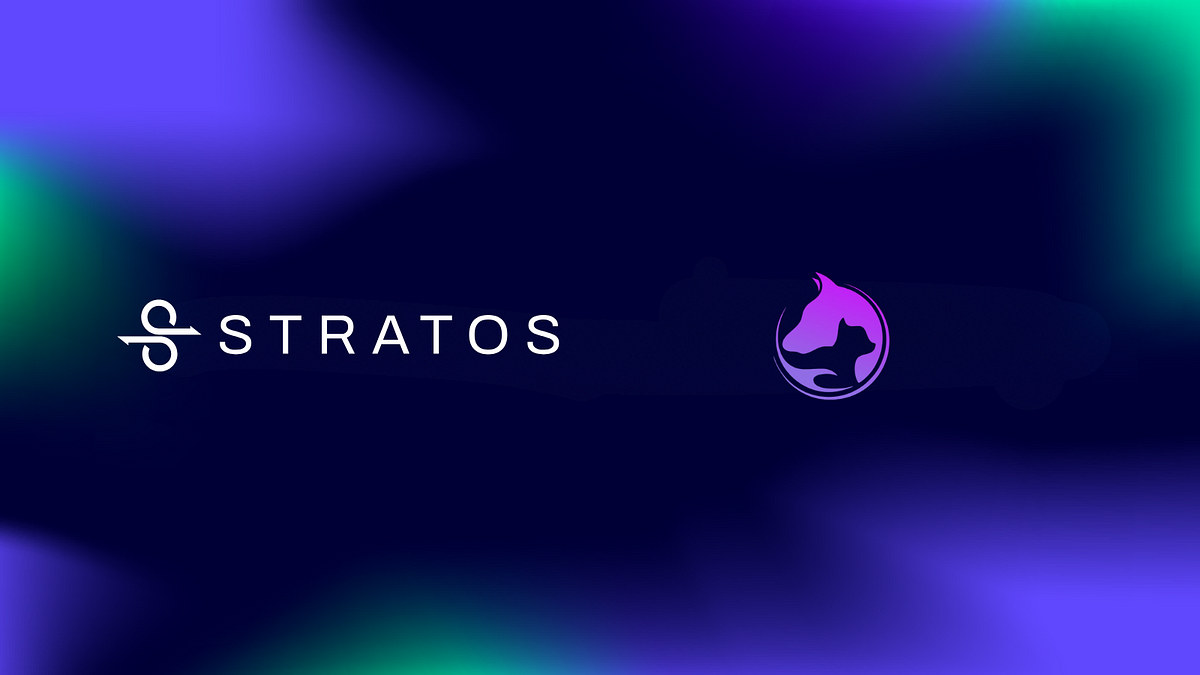
a year ago
Stratos Partners with FurGPT to Enhance Virtual Pet Art through AI and Web 3.0
Stratos has announced an exciting partnership with FurGPT, a pioneering platform that integrates AI technology with Web 3.0 to create personalized virtual pet art. This collaboration leverages Stratos' decentralized storage infrastructure, which provides secure and scalable storage solutions for the virtual pet creations and interactions of FurGPT users. Operating across multiple networks, including BNB Chain, Ethereum, and Lithosphere, FurGPT combines the creativity of AI with decentralized finance (DeFi) to enhance digital experiences in a unique way.
With this partnership, FurGPT users can expect improved performance and data security while bringing their customized digital pets to life. Stratos' decentralized storage network is designed to ensure high performance, reliability, and resilience against the limitations often found in centralized systems. This solid foundation allows FurGPT to expand its functionalities in both AI and Web 3.0, ultimately enriching the user experience and fostering creativity in the digital art space.
The collaboration between FurGPT and Stratos signifies a significant step towards empowering users to create, connect, and explore the future of interactive and decentralized digital art. By merging innovative technologies in a secure Web3 environment, this partnership is set to redefine how users engage with digital pets and art, making it a noteworthy development in the blockchain and AI landscape.
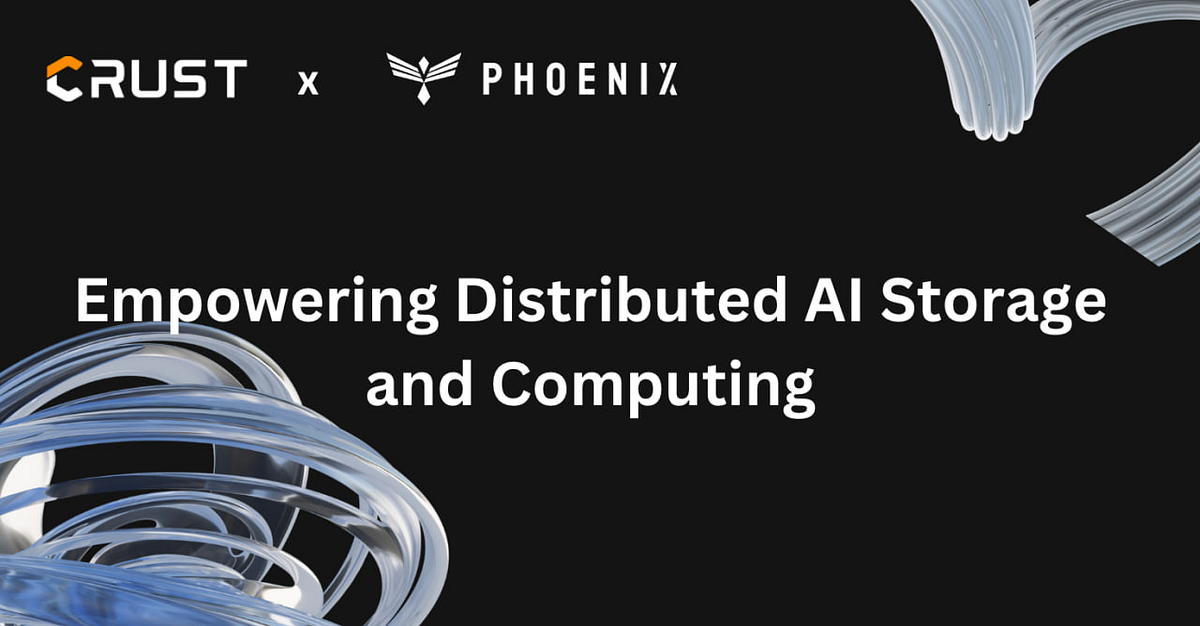
a year ago
Crust Network Partners with Phoenix AI to Enhance Decentralized Storage for AI Applications
The rapid evolution of artificial intelligence (AI) technologies, particularly in the realm of large language models (LLMs) and AI-generated content, necessitates a corresponding advancement in decentralized storage and computing infrastructures. Recognizing this critical need, Crust Network has announced its partnership with the Phoenix AI Ecosystem as the first decentralized physical infrastructure network (DePIN) storage-focused partner. This collaboration aims to enhance the capabilities of decentralized storage, which is essential for supporting the data requirements of AI applications, thereby fostering a more robust DePIN infrastructure.
Crust Network operates as a layer 1 blockchain built on substrate, incentivizing the creation and utilization of storage orders and nodes on the InterPlanetary File System (IPFS). With over 1,000 global nodes and a total storage capacity exceeding 700 petabytes, Crust has established itself as a leading decentralized cloud storage solution. The partnership with Phoenix AI will provide Crust with access to idle compute resources through Phoenix’s SkyNet AI Node Network and SkyNet Elastic Compute. This integration not only expands Crust's ecosystem beyond storage nodes but also enhances its ability to support AI-driven workloads, thereby accelerating the growth of DePIN infrastructure.
In addition to accessing compute resources, Crust Network will offer enhanced AI storage solutions by integrating with SkyNet. This partnership provides an alternative decentralized storage option alongside Filecoin for Phoenix AI’s models and datasets, granting AI developers greater flexibility and resilience in managing critical data. Phoenix AI itself is a decentralized elastic compute infrastructure designed for the seamless training and deployment of next-generation AI applications. Through this strategic alliance, Crust Network and Phoenix AI are poised to redefine the landscape of AI infrastructure, ensuring that storage and computing capabilities evolve in tandem with technological advancements.
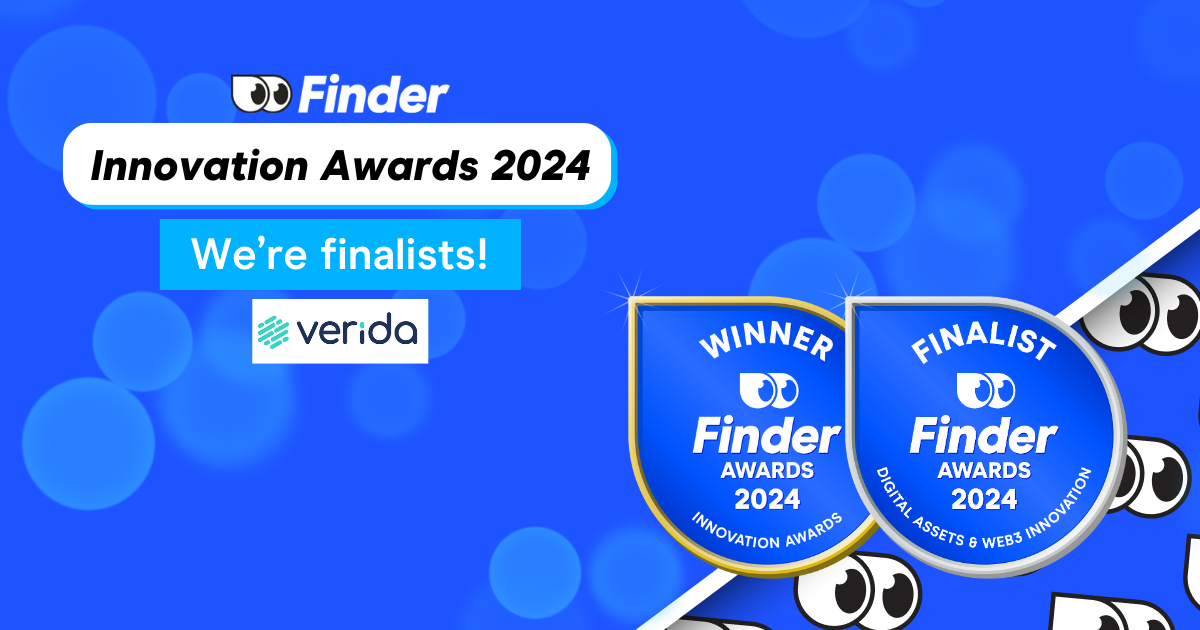
a year ago
Verida Recognized as Finalist in Finder Innovation Awards for Decentralized Data Storage
Verida has been recognized as a finalist in the Digital Assets & Web3 Innovation category of the 2024 Finder Innovation Awards, highlighting its groundbreaking efforts in decentralized data storage. The Finder Innovation Awards aim to honor brands and organizations that enhance user experiences, and Verida's focus on privacy and data protection aligns perfectly with the core values of the cryptocurrency and Web3 sectors. By offering private, encrypted data storage that complies with regulations like GDPR and CCPA, Verida empowers users to manage sensitive information without exposing personally identifiable information on the blockchain.
As artificial intelligence continues to evolve, concerns about the misuse of sensitive user data are growing. Verida addresses these issues by allowing users to withdraw their private data from major online platforms, thereby preventing it from being utilized in AI training models. This innovative approach enables users to create and control their own 'digital twins', ensuring that they can manage what data is shared with AI systems. Furthermore, Verida's global, region-aware design provides users with the flexibility to choose their data storage locations, making it a scalable solution for the Web3 market both locally and internationally.
In addition to its data storage capabilities, Verida has launched the Verida Wallet, the first mobile crypto wallet to incorporate Polygon ID zero-knowledge credentials. This wallet supports multiple networks, including Polygon, Ethereum, and NEAR, allowing users to manage and trade cryptocurrencies and NFTs seamlessly from their mobile devices. With over 80,000 digital identities created across its testnet and mainnet, Verida demonstrates a strong demand for enhanced control over private data in the crypto space. Its commitment to a privacy-first approach in digital wallets positions Verida as a leading innovator in the Web3 landscape.

a year ago
The Challenges and Future of DePIN in Blockchain Technology
Decentralized Physical Infrastructure Network (DePIN) is emerging as a significant narrative in the blockchain space, often described as the "Internet of Things (IoT) with a blockchain twist." These projects aim to connect and manage physical devices, such as energy grids and wireless networks, which generate vast amounts of data. However, the current blockchain infrastructure struggles to keep pace with the demands of DePIN applications. For instance, Helium, a notable DePIN project, transitioned from its own blockchain to Solana in April 2023, yet even Solana's high throughput capabilities are insufficient for real-time computations required by many DePIN projects.
The reliance on offchain computation is a common theme among DePIN projects. As Shuyao Kong, co-founder of MegaETH, points out, existing DePIN applications are not fully onchain due to inefficiencies and costs. While some projects may use blockchain as a marketing strategy, the reality is that they often utilize a hybrid approach, processing computations offchain and recording results onchain. This is particularly critical for executor devices, which require immediate responses, unlike sensors that can tolerate some latency. The use of blockchain in DePIN primarily serves to coordinate activities among numerous devices in a trustless manner, adding a financial incentive layer through token rewards for contributors.
Looking ahead, the future of DePIN projects will likely involve a balance between onchain and offchain processes. Current blockchain architectures are not equipped to handle the real-time demands of DePIN applications fully. However, as scalability improves, we may see an increase in onchain functionalities. Experts suggest that future DePIN projects will evolve towards modular architectures tailored for specific computational needs, such as real-time processing or large-scale data storage. This evolution is essential for the successful integration of blockchain technology into the DePIN ecosystem, ensuring that it meets the diverse requirements of various applications.

a year ago
Roam Spooky Halloween 2024 Event: Win Exciting Prizes!
The Roam Spooky Halloween 2024 Event is set to bring excitement to users from October 28 to November 11, 2024. During this period, participants can enjoy a chance to win surprise gifts valued at over 10,000 USDT. To join in on the festivities, users need to download the Roam app and utilize their Roam Points to redeem mystery gifts. These gifts can range from exclusive items to high-value rewards, making it an enticing opportunity for both new and long-time Roam users.
Among the rewards available during the event are the Roam Rainier MAX60 WiFi Router Miners, designed to enhance the Roam experience while providing high-yield mining capabilities. Additionally, participants can win the Roam Baker MAX30 WiFi Access Points, which offer reliable internet connections and daily rewards. Other exciting prizes include free eSIM data, various amounts of Roam Points that can later be converted into $ROAM tokens, exclusive Halloween stickers, and Harmony ONE tokens, making this event a treasure trove for crypto enthusiasts.
To participate, users must download the Roam app and redeem a surprise gift for just 100 Roam Points. Points can be accumulated by adding new WiFi connections, checking in, and referring friends. The event promises a thrilling Halloween celebration filled with surprises and fantastic prizes. With the event running for a limited time, participants are encouraged to gather their points and take advantage of this unique opportunity to enhance their Roam experience and crypto portfolio. Happy haunting and good luck to all Roamers!

a year ago
IoTeX Price Predictions: A Promising Future in the Crypto Market
The IoTeX coin, currently priced at $0.03817847, is gaining attention as a potential multibagger in the cryptocurrency market. With the crypto landscape showing signs of bullish evolution in 2024, IoTeX (IOTX) is projected to reach a price high of $0.0760 if the positive sentiment continues. However, if the market fails to adopt the technology widely, the price could drop to a low of $0.030. The platform, which focuses on machine economics, supports a range of devices from smart gadgets to autonomous vehicles, making it a significant player in the Internet of Things (IoT) sector.
Looking ahead to 2025, the price of IOTX could climb to $0.099, contingent on successful network integrations and user adoption. Conversely, if the platform struggles to attract users, the price may fall to $0.042. The forecast for the following years suggests a steady increase, with potential highs reaching $0.356 by 2030. This optimistic outlook is based on the assumption that IoTeX will continue to innovate and enhance its interoperability, which is crucial for its long-term success in the competitive crypto market.
Historically, IoTeX has had a volatile journey since its mainnet launch in 2019, experiencing significant price fluctuations. After an initial surge, the price fell drastically before gradually recovering. The project has shown resilience, and with the growing importance of IoT technologies, investing in IOTX appears to be a promising opportunity for long-term gains. As the market evolves, the performance of IoTeX will be closely monitored by investors looking to capitalize on its potential growth.

a year ago
Murad Mahmudov: The Rise of a Memecoin Mogul
Murad Mahmudov, a notable figure in the cryptocurrency landscape, has recently made headlines following the leak of his wallets, which revealed an impressive $25 million in memecoins. Mahmudov, who previously served as the Chief Investment Officer of the now-defunct hedge fund Adaptive Capital, has embarked on a fascinating journey in the world of memecoins. His story is marked by a significant shift in focus, as he transitioned from a traditional trading approach to embracing the burgeoning memecoin market, which he believes holds substantial potential for growth.
In 2020, Mahmudov made the surprising decision to withdraw from social media, leaving his followers in suspense. However, after a two-year break, he returned to the crypto scene with a renewed passion and a strong belief in the future of cryptocurrencies. Earlier this year, he began to advocate for memecoins, identifying them as an underexplored area within the market. By June, he had compiled a list of his top memecoin picks, which quickly gained traction and sparked discussions among crypto enthusiasts. His creation of the “Cult Memecoins” table further solidified his influence, showcasing his bullish stance on this niche.
During the recent Token2049 conference in Singapore, Mahmudov delivered a keynote address on the “Memecoin Supercycle,” emphasizing the impressive performance of memecoins compared to traditional altcoins. He noted that 13 out of the top 20 tokens had outperformed Bitcoin this year, highlighting a shift in trader interest towards memecoins as traditional altcoins faced declining appeal. The revelation of his substantial holdings, particularly a significant investment in the MINI token, has only added to the intrigue surrounding his strategies and insights in the crypto market.
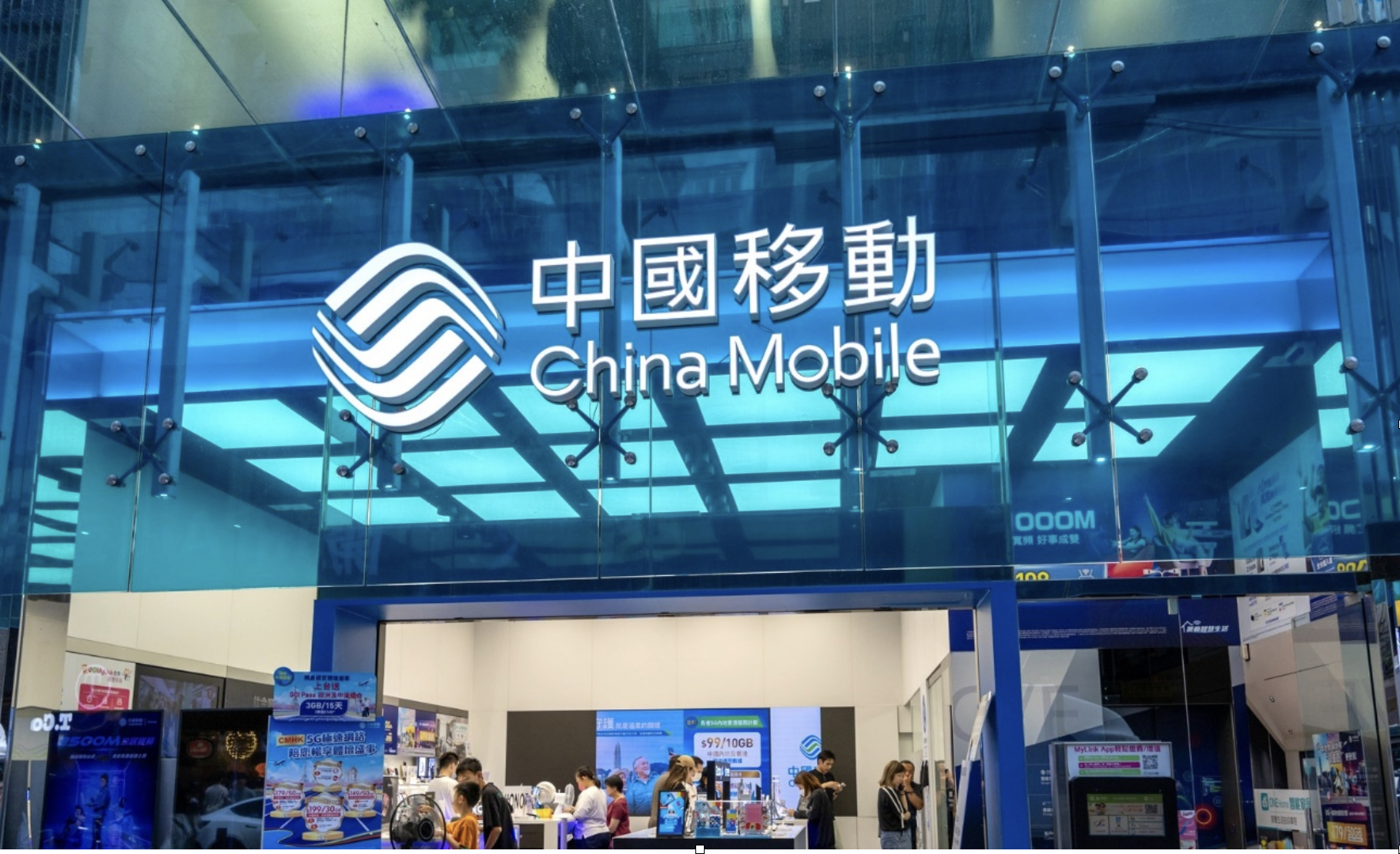
a year ago
China Mobile's Migu Partners with Phoenix for AI-Generated Content in Metaverse
China Mobile's digital content subsidiary, Migu, has announced a strategic partnership with Phoenix, a decentralized AI infrastructure platform, to enhance its applications in the metaverse and gaming through scalable AI-generated content (AIGC) infrastructure. As the largest wireless carrier in China, serving over 1 billion users, Migu caters to more than 900 million users across its diverse offerings, including video streaming, gaming, and music apps. This collaboration aims to leverage AIGC capabilities to create innovative and immersive digital experiences, which have become a focal point for Migu in recent years.
The integration of AI-powered content into the metaverse and gaming sectors presents significant challenges, requiring a robust combination of AIGC models for images, 3D content, and videos, alongside a scalable AI compute infrastructure. Phoenix's DePIN-based elastic AI compute layer, known as SkyNet, along with its ready-to-use AIGC modules within Phoenix GenAI, provides a comprehensive solution for real-time AIGC capabilities. These include functionalities such as text-to-image generation, AI-to-3D conversions, and interactive non-player characters (NPCs) powered by large language model (LLM) chatbot technology.
Moreover, the open API platform as a service (PaaS) layer of Phoenix GenAI allows Migu's extensive app ecosystem to access and customize AI-generated content on a large scale, catering to its vast user base. One notable application of this partnership could be the creation of AI-generated NFTs within Migu's metaverse applications, showcasing the potential of AIGC in enhancing user engagement and experience. This collaboration marks a significant step forward in the integration of AI technologies within the digital content landscape, promising to reshape the future of interactive entertainment.
Signup for latest DePIN news and updates